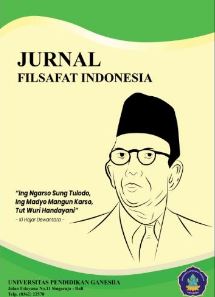Analisis Kondisi Mengetahui Tentang Pengetahuan dan Implementasinya pada Pendidikan Abad 21
DOI:
https://doi.org/10.23887/jfi.v6i3.58735Kata Kunci:
mengetahui, pengetahuan proposisional, pendidikan abad 21Abstrak
Mengetahui merupakan proses berpikir yang paling spesifik dan pengetahuan adalah hasilnya. Cabang filsafat yang mengkaji hakikat dan teori pengetahuan disebut epistemology. Kondisi mengetahui tentang pengetahuan perlu dianalisis sehingga dapat menjadi dasar seseorang mengklaim suatu proposisi sebagai pengetahuan. Pertanyaan realistis pada abad 21 adalah apa pengetahuan yang paling penting dimiliki siswa dan guru untuk mengembangkan keterampilan abad 21. Metode penelitian yang digunakan adalah library research. Penelitian dilakukan dengan menganalisis buku, artikel ilmiah, serta referensi yang relevan terkait filsafat pengetahuan dan pendidikan abad 21. Hasil analisis memberikan informasi dan makna terkait kondisi mengetahui tentang pengetahuan dan implementasinya pada abad 21, di antaranya: 1) ragam mengetahui terdiri dari mengetahui bahwa (pengetahuan proposisional), mengetahui bagaimana (pengetahuan praktis/tacit), mengetahui akan (aquitance), dan mengetahui mengapa; 2) pengetahuan proporsisional dibentuk berdasarkan Justified True Belief (JTB) condition; 3) data dan informasi merupakan dua hal penting dan mendasar dalam membentuk pengetahuan; dan 4) terdapat tiga kategori utama pengetahuan sebagai landasan dalam pembelajaran abad 21 yaitu foundational knowledge (to know), meta knowledge (to act), dan humanistic knowledge (to value).
Referensi
Cahyono, A. E., Studi Ilmu Keperawatan, P., Tinggi Ilmu Kesehatan Husada Jombang, S., Korespondensi, A., Veteran Mancar, J., Peterongan, K., Jombang, K., & Timur, J. (2019). Pengetahuan; Artikel Review. Jurnal Keperawatan, 12(1), 13–13.
Ananiadou, K., & Claro, M. (2009). 21st Century Skills and Competences for New Millennium Learners in OECD Countries. OECD Education Working Papers, 41, 33. https://doi.org/10.1787/218525261154.
Bolisani, E., & Bratianu, C. (2018). The Elusive Definition of Knowledge. Knowledge Management and Organizational Learning, 4, 1–22. https://doi.org/10.1007/978-3-319-60657-6_1.
Frické, M. (2008). The Knowledge Pyramid: a Critique of the DIKW Hierarchy, 35(2), 131–142. https://doi.org/10.1177/0165551508094050.
Jenkins, H., Clinton, K., Purushotma, R., Robison, A. J., & Weigel, M. (2009). Confronting the Challenges of Participatory Culture : Media Education for the 21 Century. MacArthur, 21(1), 129.
Johansson, L.-G. (2016). Springer Undergraduate Texts in Philosophy Philosophy of Science for Scientists. http://www.springer.com/series/13798.
Karatas, K., & Arpaci, I. (2021). The Role of Self-directed Learning, Metacognition, and 21st Century Skills Predicting the Readiness for Online Learning. Contemporary Educational Technology, 13(3), ep300. https://doi.org/10.30935/CEDTECH/10786.
Kereluik, K., Mishra, P., Fahnoe, C., & Terry, L. (2013). What Knowledge Is of Most Worth: Teacher Knowledge for 21st Century Learning. Journal of Digital Learning in Teacher Education, 29(4), 127–140.
Koehler, M. J., Harvey, D. M., & Caro, R. A. (2017). Handbook of Technological Pedagogical Content Knowledge (TPACK) for Educators. (2nd edition). Routledge. TechTrends 2017 61:4, 61(4), 404–405. https://doi.org/10.1007/S11528-017-0176-2.
Oeberst, A., Kimmerle, J., & Cress, U. (2016). What Is Knowledge? Who Creates It? Who Possesses It? The Need for Novel Answers to Old Questions. Mass Collaboration and Education, 105–124.
Porot, N., Mandelbaum, E. (2019). The Science of Belief: A Progress Report. WIREs Cogn Sci, 12(2), 1-17. https://doi.org/10.1002/wcs.1539
Rescher, & Nicholas. (2003). Epistemology : An Introduction to the Theory of Knowledge.
Shope, R. K. (2005). Conditions and Analyses of Knowing. The Oxford Handbook of Epistemology.
Sutejo, & Susanto, H. (2017). Filsafat Ilmu Telaah Kritis Akan Hakikat dan Cara Kerja Ilmu Pengetahuan.
Turyahikayo, E. (2021). Philosophical Paradigms as the Bases for Knowledge Management Research and Practice. Knowledge Management & E-Learning, 13(2), 209-224. https://doi.org/10.34105/j.kmel.2021.13.012.
Unduhan
Diterbitkan
Terbitan
Bagian
Lisensi
Hak Cipta (c) 2023 Jurnal Filsafat Indonesia

Artikel ini berlisensiCreative Commons Attribution-ShareAlike 4.0 International License.

Jurnal Filsafat Indonesia Undiksha is licensed under a Creative Commons Attribution-ShareAlike 4.0 International License.




